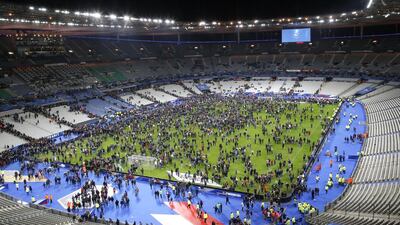Whether they occur on European streets or North African beaches, at Middle Eastern markets and Pakistani schools, terrorist atrocities are invariably followed by words that are wise or noble, angry or defiant.
Amid all that politicians, religious leaders and commentators have said about the Paris attacks on November 13 last year, Antoine Leiris’s response to the murder of his wife, one of 130 killed that night, famously combined three of those adjectives.
There was no anger. But few among the many thousands, perhaps millions, around the world who became aware of his words will quickly forget their wisdom, nobility and defiance.
“On Friday night,” he said, addressing the ISIL terrorists days after the atrocities, “you stole away the life of an exceptional being, the love of my life, the mother of my son. But you will not have my hatred.”
Now Leiris, a journalist, has expanded his message, using the final six words of the quotation cited above as the title of a paperback (Vous n’aurez pas ma haine in its original French version). An English translation will be published in October.
The book represents one bereaved individual’s way of overcoming or at least living with the grief caused when his wife, Helene, was among the 90 killed in the worst of that night’s Paris massacres, at the Bataclan concert hall.
Any quarrels we may raise on grounds of taste are easily countered. Leiris is a writer – writing may well be his therapy, not only for himself but also for a toddler left motherless.
A glance at the book also shows how effectively he has risen to the task of turning a striking catchphrase into something deeper and enduring.
In his original message, Leiris said: “I don’t know who you are and I don’t want to know. You’re dead souls. If this God for whom you kill blindly made us in his image, every bullet in the body of my wife will have been a wound in his heart.
“So no I won’t make you this gift of hating you. You asked for it but to respond to hatred with anger would be giving in to the same ignorance that made you what you are. You want me to be scared, to look at fellow citizens with suspicion, that I sacrifice my freedom for security. Lost. Same player, still playing.”
With those words, Leiris wished to defeat a clear objective of ISIL: to aggravate community tensions and in particular the stigmatisation of Islam in Europe.
And it is important to remember that his philosophy can work both ways.
At the Stade de France, one of the locations chosen for attacks, Lassana Diarra, a Muslim of Malian origin born in France, was playing for his country in a football friendly against Germany.
He heard the suicide bombers’ blasts outside the stadium but discovered only later that a cousin, Asta Diakite, was among the dead in the city centre.
Diarra spoke later with heart-warming dignity: “In this climate of terror, it is important for all of us who are representatives of our country and its diversity to speak and remain united against a horror that has no colour, no religion.”
And now France is about to hear some more words about November 13. The one member of the ISIL gang of killers known to have survived, Salah Abdeslam, was transferred this week from Belgium into French custody, having been captured in Brussels after four months on the run.
Abdeslam, his lawyer says, has resolved to “explain himself”. The words he chooses are eagerly awaited by an army of bereaved that includes Leiris and Diarra.
Colin Randall is a former executive editor of The National


